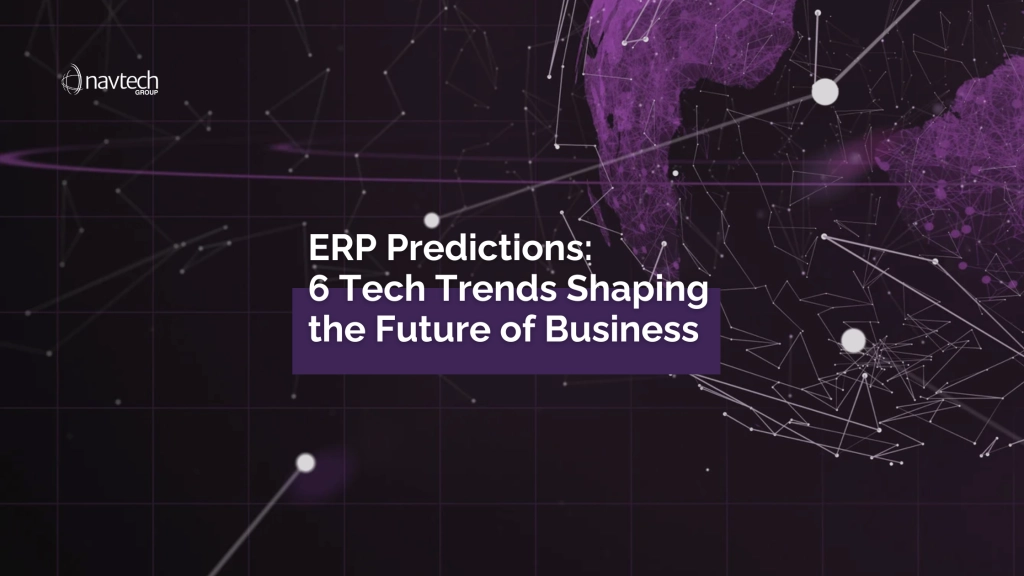ERP Predictions: 6 Tech Trends Shaping the Future of Business
"The best way to predict the future is to create it." – Peter Drucker
ERP systems have long been the backbone of enterprise operations, connecting finance, supply chains, HR, and production into a single, unified platform. But the next wave of technology is about to transform ERP from a support tool into a strategic engine for growth, efficiency, and innovation.
At Navtech, we work with companies integrating ERP systems every day, and we’re seeing firsthand how new technologies are changing what ERP can do. Here are six trends we believe will have the biggest impact on ERP systems and the businesses that rely on them.
1. AI Moves From Assistant to Decision-Maker
AI is already embedded in many ERP platforms, helping automate routine tasks like invoice processing or purchase order approvals. The next step? AI will actively inform business decisions.
-
Predictive analytics will predict cash flow, demand, and inventory.
-
Conversational AI interfaces will let employees ask questions naturally, like: “Which suppliers are consistently late?”
-
Machine learning will continuously optimize supply chains, workforce allocation and production schedules.
Why it matters: ERP systems will evolve from passive data stores into real-time, insight-driven decision engines, helping leaders act faster and more confidently.
2. Immersive ERP Experiences Through AR/VR
Spatial computing is moving out of gaming and into enterprise workflows. Companies are experimenting with:
-
AR overlays in warehouses to instantly identify stock levels or order locations.
-
VR simulations for employee training or scenario planning.
-
Executives exploring financial forecasts in interactive, 3D dashboards.
Why it matters: The way employees interact with ERP data will shift from static screens to dynamic, intuitive environments, improving understanding and reducing errors.
3. Quantum Computing in Complex Operations
Quantum computing is no longer just theoretical. Companies like IBM, Google, and startups such as Zapata Computing are testing hybrid quantum-classical solutions for real-world problems.
ERP could leverage quantum algorithms to:
-
Optimize complex supply chains with thousands of variables.
-
Model financial risk more precisely.
-
Improve logistics and resource allocation at scale.
Why it matters: Businesses with complex operations can gain a significant competitive edge, as ERP systems solve problems that were previously impossible to compute.
4. Sustainability as a Core ERP Function
Environmental, Social, and Governance (ESG) reporting is no longer optional. ERP platforms are increasingly offering modules to:
-
Track carbon footprints across suppliers and operations.
-
Optimize energy consumption in production.
-
Automate regulatory ESG reporting.
Why it matters: Sustainability metrics will become as central as financial KPIs, helping companies measure, report, and act on environmental impact efficiently.
5. Cybersecurity Becomes a Boardroom Priority
ERP platforms are mission-critical, integrating multiple business functions and often connecting with external partners. This makes security non-negotiable.
-
Zero-trust architectures and continuous monitoring are being embedded in ERP systems.
-
Blockchain-based transaction verification and identity management add another layer of protection.
-
AI-driven threat detection can identify anomalies before breaches happen.
Why it matters: Cybersecurity isn’t just an IT concern, it’s a strategic priority. ERP systems will play a central role in ensuring trust and data integrity.
6. Web3 and Decentralized ERP Integrations
While the hype around crypto has cooled, blockchain and decentralized identity solutions are maturing in practical ways.
-
Smart contracts can automatically update ERP records when conditions are met.
-
Supplier credentials can be verified via decentralized networks.
-
Cross-border ERP data sharing becomes more secure and transparent.
Why it matters: Decentralization enhances trust, efficiency, and compliance, especially in global operations with multiple partners.
Final Thoughts: ERP as the Digital Core
ERP is no longer just a back-office system, it’s becoming the digital core that drives business strategy. AI, spatial computing, quantum optimization, sustainability, cybersecurity, and Web3 are already moving from pilot projects into real-world applications.
At Navtech, we help businesses integrate ERP solutions that are not just functional today but prepared for the innovations shaping tomorrow. By acting now, you don’t just adapt - you build the future of your business.







